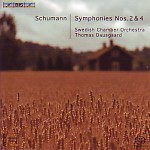I have the highest respect for Thomas Dausgaard’s conducting. His Beethoven with this same orchestra has been sensational, and he almost always reveals a keen interpretive intelligence. This mostly attractive performance of Schumann’s Fourth Symphony uses the original version, which is better scored than the revision but not so imposing structurally (particularly regarding the introductions to the first and last movements). The optimal solution, of course, would be to do what Tovey recommends: play the revised version with the earlier orchestration to the extent possible. But that practical solution would be too typical of the kind of individualistic actual practice prevalent in the 19th century. It certainly doesn’t suit the herd mentality of today’s earnest, and often earnestly unmusical, authenticity movement.
And speaking of “authenticity”: for all the lively playing in the quick movements, I can only decry the manner in which Dausgaard seems to have jumped on the “minimal vibrato” bandwagon in the Second Symphony’s slow movement. Marked “Adagio espressivo”, with the tune in all of the strings additionally described as “cantabile”, even if there were evidence for minimal orchestral vibrato in the mid-19th century (there isn’t any), there is absolutely no excuse for the kind of denatured, impersonal sonority Dausgaard obtains here. Granted, using a chamber orchestra, for all its inherent clarity of texture, inevitably undersells Schumann’s single grand symphonic adagio (the more intimate slow movement of the Fourth suffers less), but the bottom line is that the current habit of playing the music this way smacks of faddishness, and Dausgaard is a better artist than that.
The two overtures have plenty of dynamism and drive, but they also lack the necessary weight of sonority that even Schumann, orchestrationally challenged though he was, had no problem summoning at will. Their subjects, after all, are Faust and Julius Caesar, not Rocky and Bullwinkle. If you’re looking for fresh, lively, texturally pellucid Schumann, then Zinman on Arte Nova is the way to go. He has all of Dausgaard’s energy and clarity, with a bigger ensemble sound and a welcome degree of Romantic warmth from the strings.
This new disc is reportedly the first in a series of discs devoted to Romantic repertoire called “Opening Doors”. This cliché says it all. The emphasis is on being “different”, so as to justify playing the same stuff over again. This is the real motivation behind much of today’s phony, dehumanized brand of “authenticity”. An open door, after all, works in both directions: the chilly wind that blows in, at least in these performances, offers scant compensation for the expressive, idiomatic warmth that it displaces.
































